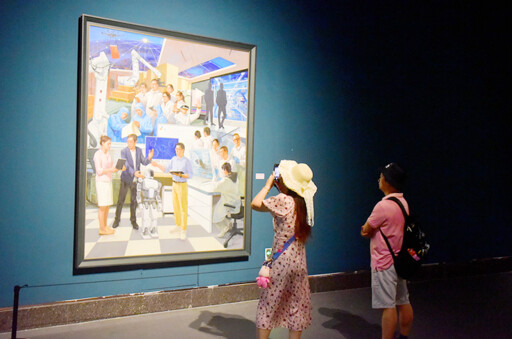


CPC plenum maps out blueprint for next five years

Visitors observe an artwork during an exhibition showcasing east China’s Zhejiang Province in the new era on the new journey at Zhejiang Exhibition Hall. Photo: IC PHOTO
On Oct. 20–23, the Fourth Plenary Session of the 20th CPC Central Committee was held in Beijing to chart China’s next phase of development. The session heard and discussed a report delivered by General Secretary of the CPC Central Committee Xi Jinping on the work of the Political Bureau and, following deliberation, adopted the Recommendations of the CPC Central Committee for Formulating the 15th Five-Year Plan for Economic and Social Development, which outlines priorities for the nation’s progress over the next five years.
Experts and scholars in the philosophy and social sciences community agreed that the plenum thoroughly assessed the historical position and defining features of China’s current development stage, and offered a scientific analysis of the strategic opportunities, risks, and challenges facing the country during the 15th Five-Year Plan (FYP, 2026–30) period, setting the course for advancing national rejuvenation on all fronts through a Chinese path to modernization.
Grasping historical initiative
The formulation and successive implementation of FYPs represent a vital approach by which the CPC governs the country, vividly exemplifying the strengths of the socialist system with Chinese characteristics. From the first FYP to the upcoming 15th FYP, each plan has served as a milestone on the nation’s journey, chronicling its historic transformation from standing up and growing prosperous to becoming strong. This process underscores the CPC’s strategic resolve and historical commitment to executing its blueprint through to completion.
The 14th FYP period (2021–25) has been extraordinary in the history of the Party and the nation. Amid a turbulent international environment and the demanding domestic agenda of advancing reform, promoting development, and maintaining stability, the CPC Central Committee with Comrade Xi Jinping at its core has rallied the entire Party and the people of all ethnic groups to confront difficulties with resolve. Their efforts have produced significant achievements that have laid the groundwork for progress during the 15th FYP period.
Yang Yanqiu, director general of the Institute of Ancient History at the Chinese Academy of Social Sciences, stated that the achievements made during the 14th FYP period fully demonstrate the exceptional wisdom and strong leadership of the CPC Central Committee with Comrade Xi Jinping at its core in navigating complex circumstances. “It is precisely this strategic resolve and relentless effort that have propelled the giant ship of China to forge ahead through the winds and waves of our times.”
Critical intellectual guidance
At the session, the CPC Central Committee outlined six guiding principles for economic and social development during the 15th FYP period: upholding the Party’s overall leadership; putting the people first; pursuing high-quality development; comprehensively deepening reform; promoting interplay between an efficient market and a well-functioning government; and ensuring both development and security.
“The six guiding principles constitute an interconnected and organic whole, serving as the fundamental guidelines and action plan for driving economic and social development during the 15th FYP period,” remarked Ouyang Kang, director of the Institute of State Governance at Huazhong University of Science and Technology.
According to Ouyang, the Party’s overall leadership is the “fulcrum” and “navigator” for the development of the cause. Putting people first represents the Party’s fundamental stance and source of strength. High-quality development is an essential requirement for adapting to the evolution of society’s principal contradiction. Comprehensive deepening of reform is the fundamental driving force for development. The effective integration of an efficient market and a well-functioning government is the key operational mechanism, while ensuring both development and security provides crucial safeguards for addressing risks and challenges.
“These six guiding principles reflect the organic unity of objective laws and subjective initiative, as well as of systems thinking and dialectical thinking,” Ouyang said.
“The 15th FYP period holds a pivotal transitional position in the process of basically achieving socialist modernization,” said Liu Zhi, executive director of the Institute of Reform and Opening Up at Shenzhen University, in an interview with CSST. The six guiding principles, he explained, systematically address the fundamental questions of “what kind of development China aims to achieve and how to achieve it” over the next five years. Their internal logic centers on the overarching goal of building a great modern socialist country in all respects and advancing national rejuvenation—providing the political assurance, value orientation, development path, driving force, institutional guarantee, and security basis for realizing this grand blueprint.
“The Recommendations adopted at the plenum serve as a political mobilization to unify thinking and pool strength,” said Luo Feng, vice president of the Shanghai Party Institute of CPC (Shanghai Administration Institute).
The Party’s innovative theories for the new era, Luo elaborated, constitute a scientific system that continues to grow and develop through practice. Confronted with profound changes unseen in a century and the overarching strategic context of pursuing national rejuvenation, these innovative theories have gained fresh vitality through the integration of the basic tenets of Marxism with China’s specific realities and fine traditional culture.
The articulation and implementation of a range of iconic concepts—such as Chinese modernization and new quality productive forces—have continually expanded the horizons of adapting Marxism to the Chinese context and the needs of our times, providing a powerful intellectual tool for the new journey, Luo added.
Ban Xiaoyue, Liu Yue, Lu Hang, Zha Jianguo, Li Yongjie, Zhang Qingli, and Chen Lian contributed to this story.
Editor:Yu Hui
Copyright©2023 CSSN All Rights Reserved